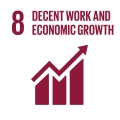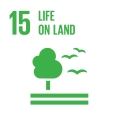MOOC: Auditing waste management
3.2. Sustainable development goals and international agreements
Sustainable development goals related to waste
Waste-related problems can undermine and are hence related to several United Nations sustainable development goals:
 “Ensure healthy lives and promote well-being for all at all ages” targets the number of deaths and illnesses from hazardous chemicals and air, water and soil pollution and contamination. (See chapter 1.1.3 for an explanation of waste-related health problems.)
“Ensure healthy lives and promote well-being for all at all ages” targets the number of deaths and illnesses from hazardous chemicals and air, water and soil pollution and contamination. (See chapter 1.1.3 for an explanation of waste-related health problems.)
 “Ensure availability and sustainable management of water and sanitation for all” aims to improve water quality by reducing pollution, eliminating dumping and minimizing the release of hazardous chemicals and materials, halving the proportion of untreated wastewater and substantially increasing recycling and safe reuse globally.
“Ensure availability and sustainable management of water and sanitation for all” aims to improve water quality by reducing pollution, eliminating dumping and minimizing the release of hazardous chemicals and materials, halving the proportion of untreated wastewater and substantially increasing recycling and safe reuse globally.
 “Promote sustained, inclusive and sustainable economic growth, full and productive employment and decent work for all” aims to ensure sustained and inclusive economic growth. As one important element in this guest, resource productivity needs to increase significantly in order to decrease national material footprints and domestic material consumption. Shifting from waste management to circular economy is also a key policy development to achieve these goals.
“Promote sustained, inclusive and sustainable economic growth, full and productive employment and decent work for all” aims to ensure sustained and inclusive economic growth. As one important element in this guest, resource productivity needs to increase significantly in order to decrease national material footprints and domestic material consumption. Shifting from waste management to circular economy is also a key policy development to achieve these goals.
 “Build resilient infrastructure, promote inclusive and sustainable industrialization and foster innovation” aims to upgrade infrastructure and retrofit industries to make them sustainable, with increased resource-use efficiency and greater adoption of clean and environmentally sound technologies.
“Build resilient infrastructure, promote inclusive and sustainable industrialization and foster innovation” aims to upgrade infrastructure and retrofit industries to make them sustainable, with increased resource-use efficiency and greater adoption of clean and environmentally sound technologies.
 “Make cities and human settlements inclusive, safe, resilient and sustainable” aims to reduce the adverse per-capita environmental impact of cities, including by paying special attention to air quality and municipal and other waste management.
“Make cities and human settlements inclusive, safe, resilient and sustainable” aims to reduce the adverse per-capita environmental impact of cities, including by paying special attention to air quality and municipal and other waste management.
 “Ensure sustainable consumption and production patterns” aims to:
“Ensure sustainable consumption and production patterns” aims to:
- halve per-capita global food waste at the retail and consumer levels;
- achieve the environmentally sound management of chemicals and all waste throughout their life cycle and significantly reduce their release into the air, water and soil to minimize their adverse impact on human health and the environment; and
- substantially reduce waste generation through prevention, reduction, recycling and reuse.
 “Conserve and sustainably use the oceans, seas and marine resources for sustainable development” aims to prevent and significantly reduce marine pollution of all kinds, in particular from land-based activities, including marine debris and nutrient pollution.
“Conserve and sustainably use the oceans, seas and marine resources for sustainable development” aims to prevent and significantly reduce marine pollution of all kinds, in particular from land-based activities, including marine debris and nutrient pollution.
 “Protect, restore and promote sustainable use of terrestrial ecosystems, sustainably manage forests, combat desertification, and halt and reverse land degradation and halt biodiversity loss” aims to preserve and sustainably use the Earth’s terrestrial species and ecosystems. Land and soil degradation is one particular area wherein the prevention and remedy of polluting wastesites or proper management of wastewater discharges are examples of important policy areas.
“Protect, restore and promote sustainable use of terrestrial ecosystems, sustainably manage forests, combat desertification, and halt and reverse land degradation and halt biodiversity loss” aims to preserve and sustainably use the Earth’s terrestrial species and ecosystems. Land and soil degradation is one particular area wherein the prevention and remedy of polluting wastesites or proper management of wastewater discharges are examples of important policy areas.
For a complete list of sustainable development goals, targets and indicators see the United Nations General Assembly resolution adopted on 6 July 2017, available at: https://undocs.org/A/RES/71/313
 AUDIT CASE: SDGs TO SUPPORT WASTE AUDITS
AUDIT CASE: SDGs TO SUPPORT WASTE AUDITS
| Guatemala – Evaluation of municipal environmental management Guatemala as a country adopted the Sustainable Development Goals by assuming the commitment with the 2030 Agenda for Sustainable Development in September 2015. The SDGs and the ‘National Development Plan: Our Guatemala 2032’ are reflected in Guatemala’s national regulations. This includes national policies related to the management of waste, which are the legal instruments used directly in SAI Guatemala’s environmental management audits, including upon evaluating the management of solid and liquid waste.Guided by this national commitment to the SDGs, SAI Guatemala reorganized its structure in 2017 and among other things established an Audit Directorate for the Environment and Natural Resources Sector which evaluates municipal environmental management. In the audit of solid and liquid waste management, problems such as residents without access to solid waste collection service, illegal waste dumps and lack of proper functioning wastewater treatment plants were addressed. |
 THINKING EXERCISE
THINKING EXERCISE
Which of the above-listed sustainable development goals is the most affected by waste-related problems in your country?
 THINKING EXERCISE
THINKING EXERCISE
In a city called XYZ there are 1 million inhabitants. Almost all of their household waste is collected via a waste-collection system run by the city. All of the collected waste is taken to two waste-incineration factories located on the city’s borders. Both factories operate in accordance with all regulations and environmental standards. Considering the UN’s sustainable development goals, is this a good solution for dealing with household waste? Can you see any problems and/or ways of improving the waste treatment?
International agreements and EU legislation
International agreements are a useful source in identifying audit criteria. This is especially so if you are conducting a compliance audit. An important task for an auditor is to identify whether your country has ratified the relevant international conventions. Some of the most important widely implemented conventions are
- Basel Convention regulates the transboundary movement of hazardous waste. One of the main requirements of the convention is the prior consent of competent authorities of the country receiving the hazardous waste before permitting export permits. Basel Convention also highlights the principles of self-sufficiency, i.e. treatment of hazardous waste in the country of origin as a first resort, and proximity, i.e. the treatment of hazardous waste closest possible to its place of origin. In 2019, countries agreed to amend Basel Convention in order to control exports and imports of most plastic scrap and waste. The amendments came into force on January 1, 2021.
- Rotterdam Convention is aimed at facilitating the sharing of information about hazardous chemicals between countries: their characteristics and national decisions on importing and exporting hazardous chemicals.
- MARPOL Convention has been devised to prevent the pollution from ships, either operational or accidental.
For longer a list of international agreements regarding waste and short descriptions thereof, refer to the INTOSAI WGEA Guidelines on Auditing Waste Management [].
If your country is a Member State of the European Union, the relevant sources for your audit criteria are directives, regulations and decisions on waste. Other countries may wish to use EU legislation for benchmarking. The EU legislation on waste is extensive and covers the general framework as well as the shipment of waste, hazardous waste, waste management operations and specific waste streams. For an overview of EU legislation on waste please see the European Commission’s web page on waste at: http://ec.europa.eu/environment/waste/index.htm
As concerns EU legislation, it is useful to know that the European Union aims to create a circular economy where waste materials are used as a resource for producing new products (covered in Module 2). The first waste-stream which is being targeted is plastics, and the aim is to make all plastic packaging recyclable by 2030. For the EU Strategy for Plastics in the Circular Economy see the European Commission’s web page at http://ec.europa.eu/environment/circular-economy/index_en.htm
 AUDIT CASE: Sweden – Transport of hazardous waste [Ref 6]
AUDIT CASE: Sweden – Transport of hazardous waste [Ref 6]
| Example of an audit with criteria based on an international convention and EU legislation The Swedish National Audit Office’s audit entitled ‘Transport of hazardous waste’ saw international agreements and EU directives and regulations used as audit criteria. The overall audit question in this audit is whether the Swedish government has oversight and undertakes effective inspection of both transboundary and domestic shipments of hazardous waste. The Basel Convention is a general audit criterion and is implemented within the EU Waste Framework Directive and EU Regulation no. 1013/2006 on shipments of waste. The regulation is by definition national law in Sweden. Furthermore, the criteria section of the report describes the basic elements regarding how waste is to be managed and how these obligations and requirements are implemented or fulfilled by national environmental law and the corresponding national waste regulation.For a summary of the audit, refer to |


 AUDIT CASE: SDGs TO SUPPORT WASTE AUDITS
AUDIT CASE: SDGs TO SUPPORT WASTE AUDITS THINKING EXERCISE
THINKING EXERCISE